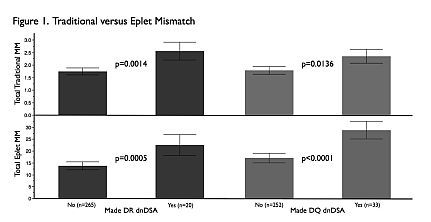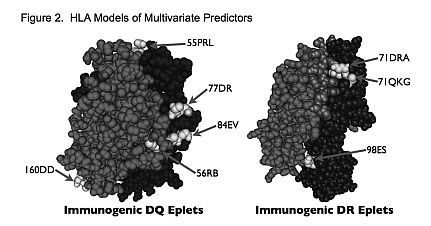Epitope Matching Outperforms Traditional Antigen Matching as a Predictor of De Novo Donor Specific Antibody Development after Renal Transplantation
Medicine, University of Manitoba, Winnipeg, Canada
Immunology, University of Manitoba, Winnipeg, Canada
Diagnostic Services of Manitoba, University of Manitoba, Winnipeg, Canada
Pediatric and Child Health, University of Manitoba, Winnipeg, MB, Canada
Pathology, University of Manitoba, Winnipeg, Canada
Meeting: 2013 American Transplant Congress
Abstract number: 408
Hypothesis:
An epitope based HLA matching approach will be predictive of de novo Donor Specific Antibody (dnDSA) development after renal transplantation.
Methods:
315 consecutive renal transplants were performed between Jan. 1999 and Dec. 2010. High resolution typing of 285/315 (91%) donor recipient pairs was performed. HLAmatchmaker software (ver. 3.0) was used to determine eplet mismatches(MM).
Results:
Prospective monitoring revealed the development of dnDSA at the HLA-DR(n=20), HLA-DQ(n=33), or both(n=8) loci. Traditional HLA mismatch was predictive of dnDSA development for HLA-DRΒ1/3/4/5 (1.7 MM vs. 2.6 MM, p=0.0014) and HLA-DQ Α/Β (1.8 MM vs. 2.4 MM, p=0.0136).

However, eplet mismatch performed better for both HLA-DR (13.7 MM vs. 22.5 MM, p=0.0005) and HLA-DQ (17.1 MM vs. 29.0 MM, p<0.0001). Twenty-two HLA-DR and 50 HLA-DQ eplets were significant univariate predictors of dnDSA and 3 HLA-DR and 5 HLA-DQ eplets were independent predictors in a multivariate model.

Furthermore, mismatched eplet load was a significant predictor of dnDSA development in a multivariate model, which included known clinical predictors (i.e. non-adherence).
Conclusion:
Eplet load better predicts dnDSA development for HLA-DQ and HLA-DR compared to traditional matching. Immunodominant eplets were defined as those most likely to lead to the development of dnDSA. This information could be used to avoid high-risk epitope mismatches prior to transplantation as well as identify patients requiring more intensive monitoring and/or immunosuppression.
To cite this abstract in AMA style:
Wiebe C, Pochinco D, Blydt-Hansen T, Gibson I, Rush D, Nickerson P. Epitope Matching Outperforms Traditional Antigen Matching as a Predictor of De Novo Donor Specific Antibody Development after Renal Transplantation [abstract]. Am J Transplant. 2013; 13 (suppl 5). https://atcmeetingabstracts.com/abstract/epitope-matching-outperforms-traditional-antigen-matching-as-a-predictor-of-de-novo-donor-specific-antibody-development-after-renal-transplantation/. Accessed February 19, 2026.« Back to 2013 American Transplant Congress
